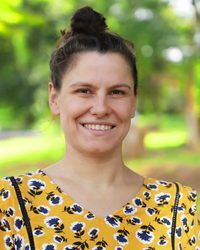Dr. Alina Marktanner is a postdoctoral researcher at the RWTH Aachen, Chair for Modern History (C19-21) with Its Knowledge and Technology Cultures. In her dissertation titled “Behördenconsulting,” she investigated the emergence of management consulting in Germany’s public sector after the 1970s. Her second book project centers on the history of pest control in German East Africa and British India around 1900. She is currently working on a source edition on the local and regional colonial history of the Rheinland and Westphalia in Germany. Her research interests include history of science, knowledge and technology, political and administrative history, and global and colonial history.
MIASA Project: Plant Health as a Colonial Conquest from the 1880s to the 1930s: A Global History of Knowledge
Around 1900, plant protection was a problem for science, business and administration. Biologically oriented subjects such as botany, zoology, entomology and mycology made plant health and its preservation as well as plant diseases and their prevention and cure the subject of investigation and fought trench warfare over disciplinary responsibilities. Lines of conflict also emerged between theory and practice: agricultural scientists and farmers usually had different ideas about plant health and remained uninterested in each other’s knowledge. In the colonial space, on the other hand, negotiations surrounding plant protection were embedded in dynamics of economic exploitation, cultural appropriation and racism. Using the example of the German Empire and colonial German East Africa as well as Great Britain and British India, the book traces how plant pathological knowledge circulated globally between the 1880s and 1930s, while always remaining locally bound and specific. Depending on the geographical and climatic context, the concept of pathogens, for example, encompassed more than insects, bacteria and fungi, as previously emphasized in research. In tropical agriculture, but also in Central Europe, bird species and rodents were also considered “pests” and required their own control methods. The importance of indigenous knowledge also varied depending on German or British colonial policy: In British India, Indian mycologists worked side by side with British colleagues and promoted traditional means of pest control in publications. In contrast, indigenous knowledge in German East Africa was included in scientific publications, but its authors remained invisible. Based on selected journal sources, the lecture presents central questions of an ongoing habilitation project and sheds light on the complexity of the discourse on plant protection around 1900.
Selected publications
Alina Marktanner, Behördenconsulting. Unternehmensberater in der öffentlichen Verwaltung der Bundesrepublik, 1970er bis 2000er Jahre, Berlin/Boston 2023.
Alina Marktanner, Experimenting for Empire: Plant Health as an Agricultural Problem in German East Africa, Togo and Cameroon, 1905-1914, History of Intellectual Culture, 3, 2024.
Alina Marktanner, The only game in town? New steering models as spaces of contestation in 1990s public administration, Administory, 6, 2022, p. 172-186.
Alina Marktanner, Neue Quellen der Beratungsforschung: Marvin Bowers Perspective on McKinsey, Vierteljahrshefte für Zeitgeschichte 70(1), 2022, p. 89–102.
Alina Marktanner, Unternehmensberater „nach dem Boom“: Von Leistungs- zu Geldelite?, Archiv für Sozialgeschichte 61, 2021, p. 425–443.




